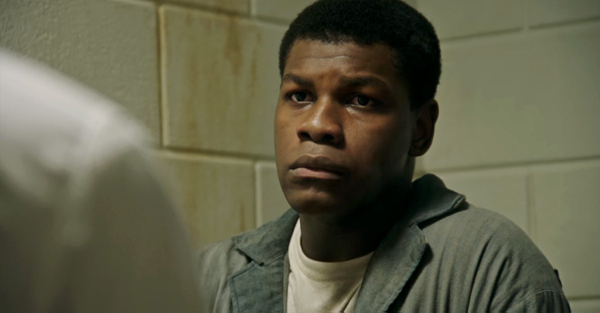Movie review by Greg Carlson
Kathryn Bigelow, to this day the only woman to win the Academy Award for Best Director, makes an admirable if flawed attempt to fictionalize key components of Detroit’s 1967 12th Street Riot. Timed in part to commemorate the 50th anniversary of the incendiary actions that resulted in 43 deaths and more than 7000 arrests, Bigelow — working for the third time with “The Hurt Locker” and “Zero Dark Thirty” scripter Mark Boal — concentrates on the so-called Algiers Motel Incident in which three black male civilians were murdered by white police officers. “Detroit” is carried along by Bigelow’s visceral facility for violence, but the filmmaker struggles to grasp the psychological interiority of the sprawling ensemble, whether black or white, guilty or innocent.
At 143 minutes, “Detroit” attempts to cover more territory than can be effectively addressed within the genre parameters of the fact-based history lesson. Following a Henry Louis Gates prologue explaining the Great Migration, a police raid on a “blind pig” leads to civil unrest that escalates until National Guard soldiers arrive. While the details of the Algiers Motel (both verified and speculative) take up the bulk of the film’s central sections, “Detroit” rushes through the aftermath of the crime. The resulting material, a streamlined and simplified abridgement of the legal proceedings that ended in jury decisions favorable to the police officers, is so different in tone to the preceding content it might have been eliminated in favor of a deeper look at security guard Melvin Dismukes (John Boyega).
Boyega does absolutely anything and everything he can with Dismukes, often wordlessly conveying the unthinkable circumstances of being witness to a terrible and dangerous situation that continues to deteriorate. As the sole person of color depicted in a frontline position of any authority during the terrorizing perpetrated by a small group of white cops, Dismukes is shown multiple times making instant decisions that imply a desire to protect the “suspects” caught up in the horrific “death game” of racist ringleader officer Philip Krauss (Will Poulter). The filmmakers, however, only gesture toward the question of Dismukes’ possible complicity in the nightmare.
Past and present remain in uncomfortable proximity, and the astonishing period detail is just about the only signpost we have to separate the Algiers from constant contemporary examples of unarmed black men dead after coming into contact with police. More than one critic has identified Bigelow’s grim and unflinching construction of brutality and mayhem as torture porn, and Krauss’ repetitive tactics certainly suggest that Bigelow was — rightly or wrongly — deliberate in her decision to take viewers through the punishing details of the gruesome “interrogations.”
As horror movies, “Detroit” and “Get Out” exist in distinctly different realms, but the readings of violence, ranging from A. O. Scott (“The specific, close-up acts of cruelty you witness are comprehensible as manifestations of a systemic, continuing and frequently invisible pattern of injustice.”) to Angelica Jade Bastien (“What is the value of depicting such nauseating violence if you have nothing to say about how that violence comes to pass or what it says about a country that has yet to reckon with the racism that continues to fester within its very soul?”) will continue to divide opinion regarding the film’s effectiveness.
